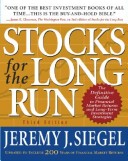Today is Remembrance Day. Regardless of what you think of the military, foreign policy, and violence in general, I think its a wonderful chance to reflect on the young men (and women) who have risked, and sometimes lost, their lives in service to their countries.

There are a few books on finance that are must reads. “Stocks for the Long Run” by Jeremy J. Siegel is one of them. I had flipped through it a year or so ago, and recently took it out from the library and read it cover-to-cover. Somewhat like William Bernstein’s “Four Pillars of Investing” (the namesake of this blog), I think these are books that you can re-read, and get more out of, as you learn and understand more about investing.
Dr. Siegel starts his book with a discussion of stocks vs. bonds. Apparently in the past there would be constant fluctuations between which was better to invest in, but since the majority of the world has adopted monetary policies that lead to inflation, over the long run equities destroy bonds (he devotes a couple dozen pages to present a very convincing case of this).
He then discusses short vs long term investing, arguing that its hard or impossible to predict short term price movements, but far easier to count on healthy returns over long periods (hence the title). Touching on risk and return and taxation, he basically advocates investing in stock indexes (which he explains in detail). He also discuses large vs small cap stocks (investing in large vs. small companies), value vs. growth stocks, IPOs, dividends (and yields), options, volatility, and behavioral finance.
He dives into the basics of stocks ownership, what some of the key metrics mean, and what drives value for the company and shareholders.
Dealing with more current events, he talks about terrorism, the aging population, bubbles (such as the Nifty Fifty and the tech boom), and global investing. The Nifty Fifty was a bubble where the public figured the top companies in the American economy were worth owning at any price, and bid them up to what are viewed as insane prices, around a 50 Price / Earnings ratio (basically it would take 50 years for the company to earn as much per share as investors were paying for them, Ben Graham suggests a P/E above 16 is overpriced). He makes the interesting case that the Nifty Fifty were actually fairly priced at the height of the bubble and would have been a good investment if held.
He destroys the idea of gold as an investment (his chapter on it is like watching Mike Tyson pummel Steve Urkel into a pulp), gives a solid overview of the business cycle, and talks about how news and world events move markets (and that you’re not going to be able to stay ahead of the legions of people reacting to this news).
He admits that there *is* some weak evidence supporting technical analysis (but seems almost embarrassed to make the admission), along with calendar anomalies (such as the January / October effects, and the distribution of market movements over the week and over the month). While he acknowledges that the data supports these effects, he cautions that they may disappear as they become more widely known.
Like Bernstein, he concludes with a couple of chapters on how to use the information in the rest of the book to construct a solid portfolio, addressing money managers, mutual fund performance and the danger, to themselves, of investors who learn a little bit about investing then make big bets.
While I wouldn’t give this book to a friend as their first introduction to investing (it might be a little daunting to work through), I think it basically falls in the “must read” category for anyone who considers themselves a DIY investor.
If you’re wondering what the good doctor would say about current market conditions, the Canadian Capitalist helpfully provided a link to this article recently.
8 replies on “Book Review: Stocks for the Long Run”
Great review – I’m going to get it out of the libary soon.
Thanks for the link Mr. C. This is one of my favourite books.
Great review. My favorite part of this book was about buying the initial 500 stocks of the S&P 500 index in 1957 and then do nothing for 50 years.. only to outperform S&P 500..
[…] Four Pillars gives a review of a book cited as one of the 10 best investing books of all time: Jeremy Siegel’s Stocks For The Long Run. […]
Thanks for the timely advise, I’ve been thinking of picking up another investing book but wanted a classic expanding my knowledge with, not the latest hot seller or trend.
Associating it with Bernstein makes it a clear winner in my view.
Damn, the audiobook version is abridged!
[…] Stocks for the long run […]
[…] Four Pillars presents Stocks for the Long Run – Book Review. […]
[…] Four Pillars presents Stocks for the Long Run – Book Review. […]